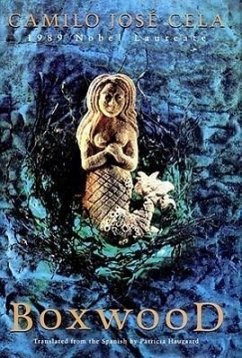Awarded the 1989 Nobel Prize for Literature, Cela, now well on in his eighties, is yet as crafty and craftful as ever. Boxwood, which can perhaps best be described as a non-novel, has none of the structural signposts readers generally expect: there is no exposition, no crux, no denouement. Instead we have a mix of folklore, tradition, superstition, autobiographical snatches, cooking directions, a litany of nautical disasters on the coast of Deathships from afar with cargoes of oranges, typewriters, iron ore, oil, spiceselements of nature both cruel and beautiful, of man both saint and sinner, whales, witches, mermaids, ghosts, the exquisite, the crass all against the background of Cela's birthplace, Galicia.
Bitte wählen Sie Ihr Anliegen aus.
Rechnungen
Retourenschein anfordern
Bestellstatus
Storno

